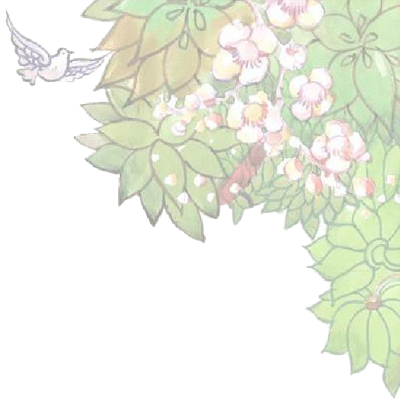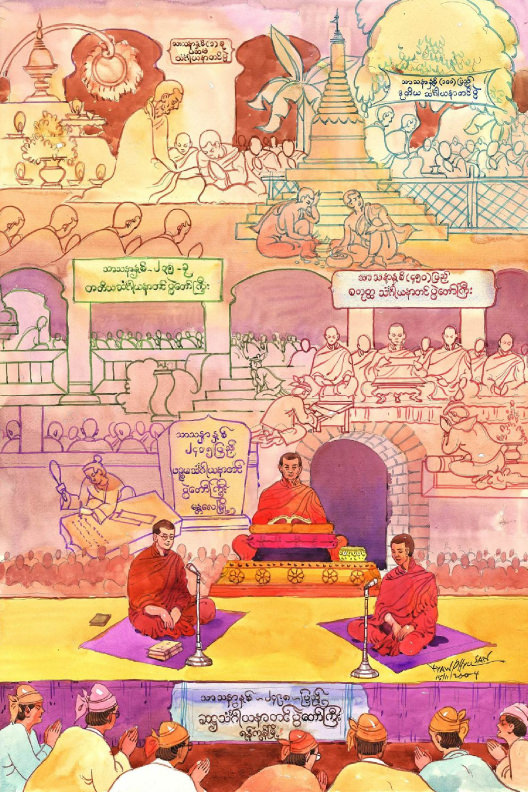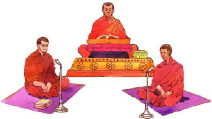69話 仏典結集

第7部 入滅のあとに
最終章 ブッダの遺産
69話 仏典結集

マハー・カッサパ尊者の心中には、スバッダのぶしつけな言葉が、いまだに鮮やかに残っていた。スバッダとは年老いて出家した比丘で、パーヴァーからクシナーラーへの旅の途上、ブッダ入滅の報せをきいて放言したのだ。あまりに無神経な発言をきかされ、マハー・カッサパ尊者は、まるで頭を雷に打たれたように法の安全性と純粋さへの懸念に満たされた。尊者は、こう考えたのである。
「ああ、ひどい。世尊が亡くなられて、わずか七日しか経っていないのに、それに金色を帯びた世尊のご遺体がいまだ存在していたときであったのに、あれほどの困難を伴って世尊が定められた教えの存在を台なしにしてしまいかねない、悪い比丘がひとり、現れたのだ。まさに彼奴は、信心の滓、僧団の棘、である。もし、あのような邪悪な比丘が増えたら、教えの未来に、大きな危険となるであろう」
そのときマハー・カッサパ尊者は、こう考えていて、窘めたり、叱ったり、しなかったのである。
「もし万一、この邪悪な比丘をいま咎め、受けるに値する処罰として、袈裟を脱がせて追放したら、人びとは、こういうであろう。『世尊のご遺体がいまだ存在しているときでさえ、仏弟子たちには、すでに不和がある』と」
しかし、次のような思いも、マハー・カッサパ尊者には浮かんだのである。
「まさしく世尊は、三ガーヴタの距離を旅された後、クシナーラーに来られ、わたしがその地で、最後の礼拝を献げることができるようになさったのだ。世尊は、わたしの比丘僧団への完全な入団をかたちづくる熱心な訓戒を三たび与えてくださった。そして世尊はわたしに、他のどの弟子にもない栄誉を授けてくださった。(訳注:マハー・カッサパ尊者は仏弟子中、「頭陀(ずだ)第一」で、衣食住にとらわれず、清貧の修行をしたことで知られる)世尊は、みずからの大麻の着古された衣を、わたしの二重の柔衣と交換して与えてくださった。まさしく、これは世尊が教団の統治管理者として、わたしを据えよう、とされたご遺志なのだ」
マハー・カッサパ尊者はまた、次のようにじっくり考えてもみた。
「もし、長老たちを招集して会議が開催され、世尊が説かれた、すべての法と律が、和合して朗唱されれば、それは善いことであろう。そうすることによって、比丘たちは法を完全に学ぶであろうし、何がふさわしく何がふさわしくないか、の律を議論するであろう。そして、あの有害な比丘は自分の身のほどを知るであろうし、間接的に叱られたことにもなろう。こうして、あのような不心得な比丘は、けっして増えないであろう。この道は、聖なる真理は、長いあいだ生きのびるであろう」
世尊のご遺骨がようやく分配されたのは、般涅槃から二、三週間後であった。ちょうどそのとき、多くの比丘はまだクシナーラーに集まっていた。この特別なときに、マハー・カッサパ尊者は、適切な折の、よき機会をとらえて、世尊の教えを比丘たちが復誦し、次世代に存続させる会議を開きたい、という提案をしたのである。
マハー・カッサパ尊者は、集まっていた比丘たちに、こう語りかけた。
「さあ、友らよ、われらは法と律を復誦し、後世に存続させようではないか。法が先を照らさず、法が後退する前に、律が先を照らさず、律が後退する前に。法ではないものを語る者たちが強くなり、法を語る者たちが弱くなる前に、律ではないものを語る者たちが強くなり、律を語る者たちが弱くなる前に」
「なるほど、では尊者さま、法と律の復誦を実行する比丘たちを、尊者が選んでくださいますように」
マハー・カッサパ尊者は、五百人よりひとり少ない阿羅漢を選んだ。しかしながら、集まっていた比丘たちは、尊者に、こういったのである。
「尊者さま、あのアーナンダ尊者がいらっしゃいます。アーナンダ尊者は、いまだ有学(セッカ)(訳注:学ぶべきことがまだ残っている者)ですが、貪ぼり、怒り、愚かさ、あるいは恐れを通した悪の道をたどっている方ではありません。アーナンダ尊者は、多くの法と、さまざまな律を広く、世尊の面前で会得されています。アーナンダ尊者も、選んでくださいますように」
会議を開くにはアーナンダ尊者が不可欠、という意見に配慮して、マハー・カッサパ尊者はそのとき、集まっていた比丘たちの承認を得て、アーナンダ尊者を最初の仏教徒会議の五百人のメンバーに加えることを認めた。
会議の開催場所として、マガダ王国の首都ラージャガハを選んだ。大都市で、滞在場所の便があり、衣食の補給にも困難はなかったからである。マハー・カッサパ尊者はそこで、僧団の公式決議(僧伽羯磨(サンガカンマ))を一つ制定した。五百人の比丘が、雨(ヴァッサ)の期間中、法と律の復誦をするためラージャガハに滞在する、そして、他の比丘は同時期、ラージャガハに滞在を許されない、というもので、集まっていた比丘たちが承認した。
そして、雨期が近づいてきたとき、選ばれた比丘たちは全員、会議のためにラージャガハへ行った。しかし、かれらは、街の周辺にあって滞在する予定の十八僧院(精舎)が長いあいだ居住していなかったせいで良好な状態ではない、と知ったのである。そこでかれらは、建物で壊れたり、崩れたりしたところを修理することに決め、最初のひと月は、それに当てて、法と律の復誦は、ふた月目に始めることにした。仏教徒会議の開催場所は、七葉(サッタパンニ)窟の近くであった。ウェーバーラ山腹で、ラージャガハから、ほど近くの地にあり、サッタパンニの大きな樹(原注:七葉樹、ラテン語の学名はAlstonia(アルストニア) scholaris(スコラリス))が生えていた。
アジャータサットゥ王の援助のもと、かれらは僧院を修理した。王はまた、七葉窟の外側に大きな特設テント(仮設堂)を立てさせ、会議を開く比丘たちのために、その他あらゆる必要な施設の準備をさせた。会議開始のときが近づくにつれ、比丘たちの中に、かれらのあいだで、こう言ってまわる者があった。
「この会議のメンバーの中に、煩悩の漏が、いまだ完全には尽きず、根絶していない比丘がひとりいるぞ」
アーナンダ尊者は、ほどなくこのあざけりを聞き、誰あろう、まぎれもなく自分のことだ、とわかった。アヌルッダ尊者ですら、アーナンダ尊者が最後に残った汚れを克服して、阿羅漢に到ったときにのみ、参加は認められる、という厳格な前提条件をつけたのである。
これを聴いて、アーナンダ尊者は、こう考えた。
「会議は、あす始まる。わたしが単なる有学として集まりに行くのは、それは、わたしにとって、真っ当ではないであろう」
涅槃をさとるための実践に入ろう、と心に決めて、アーナンダ尊者は、ひと晩中、身体の気づきに、すべての力を投入して専念した。しかし、尊者は最後に残った汚れを根絶することができなかった。そこで、夜明け近くになって、尊者は、こう考えたのである。
「ああ、いま、わたしは熱心に冥想をやりすぎて、そのおかげで、わたしの心が激しく動揺して浮ついている。したがって、わたしは、わが精進と集中のバランスをとろう」
そこで歩く冥想から戻り、足を洗う場所に立って、足を洗った。滞在所の中に入ってから、「ベッドに腰かけて、少し休息をとろう」と、考えていた。そして、ベッドの上に横になった。尊者の両足が床をはなれ、頭がまだ枕についていない、まさにそのとき、その短い瞬間に、尊者は阿羅漢に達したのである。身体の四つの威儀路(行住坐臥)のどの範疇にも入らないときであった。
(訳注:マハーシ・サヤドーの解説では「横になっている、横になっている」と念じた、その瞬間をさす。『気づきと智慧のヴィパッサナー瞑想』 マハーシ長老著、星飛雄馬訳、サンガ刊による)
法と律の復誦をする当日になった。食事を終えた後に、長老の比丘たちは全員、復誦をする会場へ行った。しかし、アーナンダ尊者は、いっしょには行かなかった。ほどなく、長老の比丘たちは全員、席について坐ったが、ひとつの席がまだ空いている、とかれらは知った。それぞれが互いに、こう尋ねた。
「あれは誰の席なのだ?」
「アーナンダのだよ」と、別の者が答えた。
「しかし、アーナンダはどこへ行ったのだ?」と、ふたたび、尋ねた。
この問答があったとき、アーナンダ尊者は、会議に行く時間だ、と考えた。そこで、アーナンダ尊者は、神通力によって、会場へ行ったのである。尊者は地中へ飛びこみ、それから自分に用意されている席に現れて坐った。マハー・カッサパ尊者とアヌルッダ尊者はこれを見て、アーナンダ尊者が目標に到達したのだ、とわかり、喜びを示した。
会議の五百人のメンバーが席についたとき、マハー・カッサパ尊者が、こう比丘たちに告げて、開会した。
「友らよ、われらは最初に、どちらから復誦しようか、法か、それとも律か?」
「尊者さま、律がブッダの命である、といわれています。律がつづく限り、ブッダの教えもつづくでありましょう。したがって、最初に、律から復誦いたしましょう」と、比丘たちが答えた。
僧団の承認を得て、マハー・カッサパ尊者は、ウパーリ尊者に、初犯者(波羅夷(パーラージカ))から始めて、すべての律について審問した。問いは、主題、発生場所、因縁話、かかわった個人、もとの決まり、修正された決まり、何が違反で、何が違反ではないのか、で構成されていた。どの律の決まりに対しても、ウパーリ尊者は申し分なく答え、その決まりを朗唱し、その朗唱に沿って、五百人の比丘たちが声をひとつに合わせて朗唱した。このようにして、律蔵(ヴィナヤ ピタカ)の全体、すなわち二つの経分別(スッタヴィバンガ)、大品(マハーヴァッガ)、小品(チューラヴァッガ)、附随(パリヴァーラ)が復誦されたのである。
律の復誦の完了後、会議は法の復誦へ、とつづけられた。マハー・カッサパ尊者は、アーナンダ尊者に、法(ダンマ)の全体について審問し、「梵網経(ブラフマジャーラ スッタ)」(長部1)から始めた。マハー・カッサパ尊者の審問は、長い経典を集めた長部経典(ディーガニカーヤ)、中ぐらいの長さの経典を集めた中部経典(マッジマニカーヤ)、関連することを一つひとつ主題ごとに相応させて集めた相応部経典(サンユッタニカーヤ)、法数にしたがって一から十一まで集めた増支部経典(アングッタラニカーヤ)、小さな経典を集めた小部経典(クッダカニカーヤ)と、進められた。主題、発生場所、因縁話、かかわった個人、について問うた。経典ことごとくの審問終了時に、五百人の比丘たち全員が、声をひとつに合わせて朗唱した。
このようにしてブッダの教えは、第一回の仏教徒会議(第一結集)で、編集され、整理されたのである。そして、三つの籠(Piṭaka(ピタカ))、すなわち律蔵(ヴィナヤ ピタカ)、経蔵(スッタ ピタカ)、論蔵(アビダンマ ピタカ)に、まとめられた。「三蔵(ティ ピタカ)」として知られており、現代の今日まで保存されている。
(訳注:なお、経・律・論の三蔵のうち、経と律はこのとき確定したが、論、すなわちアビダンマは史書には第三結集のときまで何も記録されていない)
法と律の復誦が終わったとき、アーナンダ尊者は会衆に、こう告げた。
「尊者のみなさま方、ご臨終のまぎわに、世尊はわたしに、こういわれました。『アーナンダよ、もし、望むのであれば、僧団はわたしの亡き後、ささいな、そして、小さな戒律は、廃止してもよいのです』と」
「しかし、友アーナンダよ、そなたは世尊に、ささいな、そして、小さな戒律とは、これらですか、と尋ねたのか?」
「いいえ、尊者のみなさま方、わたしは世尊に尋ねませんでした」
そこで、長老の比丘たちが、何がささいな、そして、小さな戒律なのか、議論したのだが、結論には至らなかった。したがって、マハー・カッサパ尊者が会衆に、こう説いた。
「もし、万一、われらが実際には知らない、ささいな、そして、小さな戒律を、われらが廃止したとしたら、在家の人びとは、こういうであろう。『ゴータマ行者の弟子たちは、師がまだ、かれらのあいだにいたときのみ、修行の決まりを守っていた。しかし、かれらの師が亡くなって後、いくらもたたず、かれらは修行の決まりを守っては修行しないのだ』と。もし、僧団にとってふさわしいように見えるなら、われらは定められていないものは定めるべきではないし、定められているものは廃止すべきではない。われらは一致して、定められた修行の決まりにしたがって、進むべきだ」
長老の比丘たちは、アーナンダ尊者をいくつかの不品行の罪で非難した。
第一に、ささいな、そして、小さな戒律とは何を意味しているのか、世尊にお尋ねしなかったことが糺弾された。アーナンダ尊者は、お尋ねしなかったのは気づきがなかったせいではありません、と答えた。ちょうどそのときは世尊が亡くなられるまぎわで、アーナンダ尊者は深い悲しみに圧倒されていたのだ。
第二に、世尊の雨衣の繕いものをしている最中に、それを踏みつけてしまったことが非難された。アーナンダ尊者は、世尊に対して尊敬していないことから、そうしたのではありません、と答えた。世尊の雨衣の上を歩いて踏んでしまうのを誰も止めてくれなかったせいであった。
第三に、世尊のご遺骨への礼拝に当たって、まず先に女性たちに許したことが非難された。彼女らは世尊のご遺骨を涙で濡らしてしまったのである。アーナンダ尊者は、葬儀のそのときは、彼女らを長いあいだ引き留めることもなく、暗くなる前に帰れるようにさせてあげたかったからです、と答えた。
第四に、世尊によって入滅のヒントがわかりやすく与えられたにもかかわらず、世尊の寿命の最大期間生きてくださいますように、と懇願するのに失敗したことが非難された。アーナンダ尊者は、ちょうどそのとき、わたしは、悪魔(マーラ)の影響下にあったのです、と答えた。
第五に、女性たちを僧団に加えることを許す、と世尊が宣言されますように、と熱心に世尊にお願いしたことが非難された。アーナンダ尊者は、世尊の生母の妹で、世尊の養母として世尊がこどもの時代、自分自身の息子よりも手厚く世尊を養育されたマハーパジャーパティ・ゴータミーのことを配慮したからです、と答えた。
それでもやはり、長老比丘たちの確固とした信から出された非難であり、アーナンダ尊者は、いずれの非難にも不品行として気づいていることを知らせた。
それからアーナンダ尊者は会衆に、世尊がまた、亡くなられる直前、チャンナ尊者には梵罰を科すべきです、と指示されたことを知らせた。会衆は、アーナンダ尊者みずからがチャンナ尊者に梵罰を申し渡すように、と依頼した。アーナンダ尊者は多数の比丘といっしょに、チャンナ尊者が住むコーサンビーへ行き、梵罰を科すことをチャンナ尊者に明らかにした。
チャンナ尊者がこれをきいたとき、まさにその場で倒れ落ちて、気を失った。気を取り戻したとき、かれは深く恥じ入り、深い悔悟の念と悲しみにとらわれた。それからかれは遠離のうちに住まい、たゆまず精進して、短期間に阿羅漢となった。チャンナ尊者はそのとき、アーナンダ尊者のもとへ行き、梵罰を破棄するように、と懇願した。アーナンダ尊者は、チャンナ尊者が覚りをひらくやいなや、梵罰は効力を停止しました、と答えたのである。
このあと五回の仏典結集
第二回仏教徒会議(仏典結集)は、ヴェーサーリー市のヴァールカーラーマ僧院で、世尊入滅後一世紀の仏紀百年(100 B.E.)、西暦の紀元前443年(443 B.C.)に開催された。ヴェーサーリーのヴァッジ族の比丘は習慣化している十点の活動で法に反している(十事非法(ダサヴァットゥーニ)訳注:比丘が金銭の布施を受けて貯めた、など十点で、それを認めるかどうかで、大衆部と上座部の「根本分裂」の原因となった)、ということから会議は開かれた。七百人の阿羅漢が会議に参加し、サッバカーミ尊者が議長に選出された。カーラーソーカ王が必要なものの援助をして、会議は八か月つづいた。
第三回の仏典結集は、パータリプッタのアソーカラーマ僧院で、仏紀235 年、西暦の紀元前308年に開催された。この会議の主たる開催理由は、僧団に侵入してきた六万人の異教徒によって、ブッダの教えの純粋性が汚されているのを防護するためであった。モッガリプッタ・ティッサ尊者が会議の議長を務め、一千人の阿羅漢が参加した。アソーカ王の援助下、会議は九か月つづいた。会議後、仏教の布教使節が九つのさまざまな国々に派遣され、ブッダの教えを広めた。
第四回の仏典結集は、アーローカ石窟寺院で開かれた。セイロン(現在のスリランカ)のマタレ村か、マラヤ村で、仏紀450年ごろ、ヴァッタガーマニー王の治世当時である。この会議はアルヴィハーラ、またはアーローカヴィハーラ会議と呼ばれる。そのころ、仏教徒の実践と文化が、人類の戦争と飢餓を通じて、増大する物質主義と道徳的衰退に、脅かされていた。長老の比丘らは、そのような危険は未来にも現れるであろう、そして、比丘らが気づきと集中、智慧の衰退のせいで、法と律を暗記できなくなるであろう、と予見したのである。そこでラッキタ大長老尊者が議長となって、五百人の学僧が会議を開いたのであった。会議の期間中、すべての仏典(三蔵(ティピタカ))と註釈書(アッタカター)が椰子の葉に書き記された。かくして、何世紀にもわたって口承で伝えられてきた仏教の聖典は、この会議で書物となった。会議は一年間つづき、王のひとりの大臣が援助した。
第五回の仏典結集は、ミャンマーのマンダレーで、仏紀2415年、西暦1871年の十一月に、開かれた。ジャーガラービワンサ尊者によって率いられた二千四百人の比丘が、この会議に参加した。ミンドン王が、会議を始めさせ、終わりまで援助した。会議の期間中に、すでに椰子の葉に書き記されていたパーリ語の三蔵が、729枚の大理石の石板に記録された。すなわち、律蔵(ヴィナヤ ピタカ)111枚、経蔵(スッタ ピタカ)410枚、論蔵(アビダンマ ピタカ)208枚である。記録作業はマンダレーヒルの麓のマハー・ローカマーラジナ・クドードォ仏塔の境内で行われた。作業には七年六か月と十四日間かかった。それから、比丘たちは、石板の碑文が正しいものである、と認証するため朗唱し、それには五か月と三日かかったのである。
第六回の仏典結集は、1954年5月、ウェーサーカー月の満月の日に、ミャンマーの首都ヤンゴンのマハーパーサーダ聖洞窟のカバーエー仏塔で正式に開会した。会議は、ブッダの教えの純化と増進をめざして開催された。諸国から集まった二千五百人の学僧、とりわけミャンマー、タイ、スリランカ、カンボディア、ラオスから会議に多く参加したのである。レーワタ尊者(ニャウン・ヤン・サヤドー)が議長、ソーバナ尊者(マハーシ・サヤドー)が質問者、ウィチッタサーラービワンサ尊者(ミングン・サヤドー)が応答者を、それぞれ務めた。会議の期間中、パーリ語の三蔵(ティピタカ)と註釈書(アッタカター)と復註(ティーカー)が再検査された。1954年に開会した会議は、1956年のウェーサーカー月の満月の日まで開かれ、ブッダの般涅槃(パリニッバーナ)の2500年目当日とぴったり一致したのであった。
Iti pi so Bhagavā(イティ ピ ソー バガワー)
Arahaṃ(アラハン)
Sammāsambuddho(サンマー サンブッドー)
Vijjācaraṇasampanno(ヴィッジャー チャラナ サンパンノー)
Sugato(スガトー)
Lokavidū(ローカ ヴィドゥー)
Anuttaro Purisadammasārathi(アヌッタロー プリサ ダンマ サーラティー)
Satthā Devamanussānaṃ(サッター デーワ マヌッサーナン)
Buddho(ブッドー)
Bhagavā’ti(バガワーティ)
世尊は
阿羅漢であり、
正自覚者であり、
明行(八種の智慧と十五種の性格に関する徳行)具足者であり、
善逝であり、
世間解であり、
無上の調御丈夫であり、
天人師(人間、神々ら一切衆生の唯一の師)であり、
覚者であり、
世尊であります。
(ブッダの九徳 「旗先経」 相応部経典 有偈篇 帝釈相応より)
終わり
※ 画像やテキストの無断使用はご遠慮ください。/ All rights reserved.

Episode 69 THE BUDDHIST COUNCILS (END)
It was still fresh in the Venerable Mahā Kassapa’s mind the callous words spoken by Subhadda—an elderly bhikkhu in his company who became a bhikkhu at his late age—during their journey from Pāvā to Kusinārā. Hearing these irreverent remarks, the Venerable Mahā Kassapa was filled with alarm for the safety and purity of the Dhamma, as though he was struck by thunder on the head. He thought: “Alas, this has been only seven days since the Blessed One passed away and when His golden-hued body is still in existence, but there has arisen a bad bhikkhu who could spoil the existence of the Teachings, which had been set up with so much difficulty by the Blessed One. Indeed, he is a scum of the religion, a thorn to the Order of Bhikkhus. There would be a great danger to the Teachings in the future if such a wicked bhikkhu
should grow.”
At that time, the Venerable Mahā Kassapa neither admonished nor rebuked him, thinking: “If I were to censure and had this wicked bhikkhu disrobed as he deserved now, the people would say, ‘Even when the remains of the Blessed One are still in existence, His disciples are already in disharmony.’ I must be patient.”
But, these thoughts occurred to the Venerable Mahā Kassapa: “Indeed, the Blessed One had come to Kusinārā after travelling three gāvutas to enable me to pay my last respects to Him there. He had given me the triple exhortation which constituted my full admission into the Order of Bhikkhus. And He had bestowed me an honour not shared by any other disciple. He had given His hempen and worn-out rag robes in exchange for my soft double-robe. Indeed, this was the Blessed One’s will to
set me up as the custodian of His Dispensation.”
The Venerable Mahā Kassapa also reflected thus: “It would be good if a council of elders were convened to recite in harmony all the Dhamma and the Discipline expounded by the Blessed One. By doing so, the bhikkhus will learn the Dhamma thoroughly and discuss the Discipline on the matters that are proper and improper. And such a mischievous bhikkhu will know his position and will be indirectly rebuked. Thus, such an ill-behaved bhikkhu will never grow. This way, the holy Truth would survive for a long time.”
It was a few weeks after the Mahāparinibbāna when the relics of the Blessed One had just been distributed. At that time, a large number of bhikkhus still assembled at Kusinārā. On that occasion, the Venerable Mahā Kassapa met the right time and the good opportunity to propose his idea of holding a council of bhikkhus to rehearse the Blessed One’s Teachings and to preserve them for the next generations.
The Venerable Mahā Kassapa related to the congregation of bhikkhus, saying: “Now, friends, let us rehearse the Dhamma and the Discipline and preserve them for posterity, before what is not the Dhamma shine forth and the Dhamma is withheld, before what is not the Discipline shine forth and the Discipline is withheld, before those who speak what is not the Dhamma become strong and those who speak the Dhamma become feeble, before those who speak of what is not the Discipline become strong and those who speak of the Discipline become feeble.”
“Well then, honoured sir, let the Venerable one select the bhikkhus to carry out the rehearsal of the Dhamma and the Discipline.”
The Venerable Mahā Kassapa selected five hundred Arahants, less one. However, the congregation of bhikkhus said to him: “Venerable sir, there is the Venerable Ānanda. Although he is still a sekkha, he is not one to follow a wrong course through desire, anger, delusion or fear. He has mastered much of the Dhamma and the Discipline of a wide variety in presence of the Blessed One. Let the Venerable one select the Venerable Ānanda as well.”
Considering that the position of the Venerable Ānanda was essential for holding the Council, the Venerable Mahā Kassapa then admitted the Venerable Ānanda to complete the five hundred members of the First Buddhist Council with the approval of the congregation.
They chose Rājagaha, the capital city of the Magadha Kingdom, for the place for holding the Council as it was a big city with plenty of accommodation, and there was no difficulty about supplies. The Venerable Mahā Kassapa then made a Formal Act of the Saṁgha (Saṁghakamma), which was approved by the congregation that the five
hundred bhikkhus would stay at Rājagaha during the rains (vassa) for the purpose of rehearsing the Dhamma and the Discipline; and that other bhikkhus were not allowed to stay at Rājagaha during the same period.
And when the rains was approaching, all the bhikkhus selected for the Council went to Rājagaha. But, they found that the eighteen monasteries for their residence around the city were not in a good condition due to long non-occupancy. So, they decided to repair the broken and dilapidated parts of the buildings and compounds during the first month, and would start the rehearsal of the Dhamma and the
Discipline in the second month. The place of the Buddhist Council was near the Sattapaṇṇi Cave, situated on the side of Mount Vebhāra, near Rājagaha, where the great Sattapaṇṇi tree (Alstonia scholaris) grew.
Under the patronage of King Ajātasattu, they made repairs of the monasteries. The king also had a grand pavilion erected outside of the Sattapaṇṇi Cave and made ready all other necessary arrangements for the bhikkhus in holding the Council.
When the time set for the Council came closer, some bhikkhus went about, saying among themselves: “Among the members of this Council, there is still one bhikkhu who has not completely eradicated his cankers.” The Venerable Ānanda soon heard this ridicule and knew that it was no one else but himself. The Venerable Anuruddha even gave a strict prerequisite that the Venerable Ānanda should only be admitted if he could overcome the last taints and attained Arahantship.
Hearing this, the Venerable Ānanda thought: “The Council will begin tomorrow. It would not be proper for me if I should go to the assembly as a mere sekkha.” Having determined himself in the practice to realise Nibbāna, he applied all his effort in the mindfulness of the body throughout the night, but he was not able to eradicate all his last taints. Then, when it was near dawn, he thought: “Now my effort is over-exerted and this makes my mind agitated. I shall therefore balance my effort and concentration.” So, he came down from the walk, and standing in the foot-washing place, he washed his feet. He entered his dwelling, thinking: “I shall sit on the bed and take a little rest,” and he reclined his body on the bed. As his two feet had left
the floor and his head had not yet reached the pillow, in that short interval, he reached Arahantship, without assuming any of the four bodily postures.
Proceedings of the Council
It was the day of the rehearsal of the Dhamma and the Discipline. Having finished their meal, all the elder bhikkhus went to the assembly hall for the rehearsal, but the Venerable Ānanda did not go together with them. Soon, after all the elder bhikkhus were seated, they came to know that one seat was still unoccupied. They asked each other: “Whose seat is it?”
“It is Ānanda’s,” the other replied.
They asked again: “But, where has Ānanda gone?”
When they asked that question, the Venerable Ānanda thought that it was his time to go to the Council. Then, the Venerable Ānanda went there by his psychic power; he dived into the earth and then showed himself sitting on the seat reserved for him. When the Venerable Mahā Kassapa and the Venerable Anuruddha saw this, they knew he had attained his goal and expressed their joy.
When the five hundred members of the Council were seated, the Venerable Mahā Kassapa commenced the Council by addressing the bhikkhus: “Friends, which shall we rehearse first, the Dhamma or the Discipline?”
The bhikkhus replied: “Venerable sir, the Discipline is called the life of the Buddha’s Teaching. As long as the Discipline lasts, the Buddha’s Teaching will last. Therefore, let us first rehearse the Discipline.”
With the permission of the Saṁgha, the Venerable Mahā Kassapa interrogated the Venerable Upāli on the whole Discipline, beginning with the First Defeat (Pārājika). The questions comprised the subject matter, the place of origin, its background story, the individual concerned, the original rule, the amended rule, what was an offence, and what was not an offence. For every disciplinary rule which had
been answered well by the Venerable Upāli, a recitation of the rule—along with its source—was done in unison by all the five hundred bhikkhus. In this way, the whole Basket of the Discipline (Vinaya Piṭaka), i.e. two Suttavibhaṅgas, the Mahāvagga, the Cullavagga, and the Parivāra were recited.
After the rehearsal of the Discipline was completed, the Council continued with the rehearsal of the Dhamma. The Venerable Mahā Kassapa interrogated the Venerable Ānanda on the whole Dhamma, beginning with the Brahmajāla Sutta. He proceeded the interrogation on the whole Collection of Long Discourses (Dīgha Nikāya), the Collection of Middle-Length Discourses (Majjhima Nikāya), the Collection of Kindred
Sayings (Saṁyutta Nikāya), the Collection of Gradual Sayings (Aṅguttara Nikāya), and the Minor Collection (Khuddaka Nikāya). He questioned the subject matter, the place of origin, its background story, and the individual concerned. At the end of every discourse (sutta), all the five hundred bhikkhus recited the discourse in unison.
Thus, the Teachings of the Buddha were compiled and arranged in this First Buddhist Council. And as they were collected in three baskets, i.e. the Basket of the Discipline (Vinaya Piṭaka), the Basket of Discourses (Sutta Piṭaka), and the Basket of the Higher Doctrine (Abhidhamma Piṭaka), they are known as the “Tipiṭaka”, which is
preserved up to the present day.
When the rehearsal of the Dhamma and the Discipline was done, the Venerable Ānanda told the assembly: “Venerable sirs, at His imminent passing away, the Blessed One spoke to me: ‘Ānanda, if it wishes, the Saṁgha may abolish the lesser and minor rules after My passing away.’”
“But, friend Ānanda, did you ask the Blessed One what these lesser and minor rules were?”
“No, Venerable sirs, I did not ask the Blessed One.”
Then, the elder bhikkhus discussed about what these lesser and minor rules really were, but they could not reach a conclusion. Thereupon, the Venerable Mahā Kassapa addressed the assembly: “If we were to abolish these lesser and minor rules which we actually do not know, the lay people might say: ‘The disciples of the recluse Gotama observed the training rules only when their Master was still amongst them. But soon after the passing away of their Master, they do not train themselves in the training rules.’ If it seems proper to the Saṁgha, we should not lay down what has not been laid down, nor should we abolish what has been laid down; we should proceed in conformity with and according to the training rules which have been laid down.”
The elder bhikkhus charged the Venerable Ānanda with several offences of wrongdoing. First, he was arraigned for not asking the Blessed One what was meant by the lesser and minor rules. The Venerable Ānanda replied that it was out of unmindfulness that he did not ask the Blessed One; at that time, he was overwhelmed with grief at the imminent passing away of the Blessed One.
Second, he was charged of having stepped on the Blessed One’s rains-cloth while he was sewing it. The Venerable Ānanda replied that it was not out of disrespect to the Blessed One; it was because there was no one to help him that he had trod on the Blessed One’s rains-cloth.
Third, he was charged with having permitted women to salute first the Blessed One’s remains; they made the Blessed One’s remains smeared with their tears. The Venerable Ānanda replied that at the time of the funeral, he did not want to detain them for a prolonged period so that they may return home before dark.
Fourth, he was charged with failing to beg the Blessed One to remain for an aeon even though a broad hint was given by the Blessed One. The Venerable Ānanda replied that at that time he was under the influence of Māra.
Fifth, he was charged with having pleaded for the going forth of women into the Order proclaimed by the Blessed One. The Venerable Ānanda replied that he did so by considering that Mahāpajāpati Gotamī was the sister of the Blessed One’s mother, His foster mother, who had nursed Him in His infancy more than her own son.
Nevertheless, out of faith in the elder bhikkhus, the Venerable Ānanda acknowledged each of them as a wrongdoing.
Then, the Venerable Ānanda informed the assembly that the Blessed One had also instructed him immediately before His passing away that the higher penalty should be imposed upon the Venerable Channa. The assembly requested the Venerable Ānanda himself to enjoin the higher penalty on the Venerable Channa. He went along together with a large number of bhikkhus to Kosambī, where the Venerable Channa was living, and declared it to him.
When Venerable Channa heard this, he fell down and fainted at that very place. When he regained his senses, he was deeply ashamed and was seized with deep repentance and grief. Then, he dwelt in seclusion, put forth his strenuous effort and within a short time he became an Arahant. The Venerable Channa then went to the Venerable Ānanda and begged him to revoke the penalty. The Venerable Ānanda replied that as soon as he had realised perfection, the penalty had ceased to be
effective.
The Five Successive Councils
The Second Buddhist Council was held at the Vālukārāma Monastery near the City of Vesālī, a century after the passing away of the Blessed One, in 100 B.E. (443 B.C.). It was held because the Vajjian bhikkhus from Vesālī were in the habit of practising the Ten Points (Dasavatthūni), which were unlawful. Seven hundred Arahants participated at this Council, wherein the Venerable Sabbakāmi was elected president. King Kālāsoka gave the necessary support to the Council, which lasted eight months.
The Third Buddhist Council was held at the Asokārāma Monastery at Pāṭaliputta in 235 B.E. (308 B.C.). The main reason of holding this Council was to protect the purity of the Buddha’s Teaching from being polluted by sixty thousand heretics who infiltrated into the Saṁgha. The Venerable Moggaliputta Tissa presided over the Council, which was participated by one thousand Arahants. The Council lasted nine months under the patronage of King Asoka. After the Council, Buddhist missionaries were sent to nine different countries to propagate the Buddha’s Teachings.
The Fourth Buddhist Council was held at the Āloka Cave, in the Village of Matale or Malaya in Ceylon, about 450 B.E., during the reign of King Vaṭṭagāmani Abhaya (101-77 B.C.). This Council was called Aluvihāra or the Ālokavihāra Council. It was said that at that time the Buddhist religious practice and culture were threatened by
growing materialism and moral decline of mankind through wars and famines. The elder bhikkhus foresaw that if such a danger were to appear in the future, the bhikkhus would not be able to memorise the Dhamma and the Discipline by heart due to the declination of their power of mindfulness, concentration and wisdom. Then, five hundred learned bhikkhus under the presidentship of the Venerable Rakkhita
Mahāthera held the Council. During the Council, the entire Buddhist Scriptures (the Tipiṭaka) and the Commentaries (Aṭṭhakathā) were inscribed on palm leaves. Thus, the Buddhist Scriptures, which were transmitted orally for a number of centuries, were put to writing in this Council. The Council lasted one year and was patronised by a minister of the king.
The Fifth Buddhist Council was convened at Mandalay, Myanmar, in 2415 B.E. (in November 1871 A.D.). Two thousand and four hundred bhikkhus led by the Venerable Jāgarābhivaṁsa participated in this Council. King Mindon initiated and gave support to the Council up to the end. During this Council, the Tipiṭaka Pāḷi—already trascribed on palm leaves—was recorded on as many as 729 marble slabs viz. 111 marble slabs of the Vinaya Piṭaka, 410 marble slabs of the Sutta Piṭaka, and 208 marble slabs of the Abhidhamma Piṭaka. The recording was done in the precinct of the Mahā Lokamārajina Kuthodaw Pagoda, at the foot of the Mandalay Hill. It took seven years, six months and fourteen days to complete this work. Then, the bhikkhus rehearsed to approve the inscriptions for five months and three days.
The Sixth Buddhist Council was inaugurated on the full-moon day of Vesākha (May) in 1954 in the Mahāpāsāṇa Cave, Kabā-Aye, Yangon, Myanmar. The Council was held aiming at the purification and promotion of the Buddha’s Teaching. Two thousand and five hundred learned bhikkhus from various countries, particularly Myanmar, Thailand, Sri Lanka, Cambodia, and Laos, took part in the Council. The Venerable Revata (Nyaung Yan Sayādaw) was the president of the Council, the Venerable Sobhana (Mahāsī Sayādaw) the questioner, and the Venerable Vicittasārābhivaṁsa (Mingun Sayādaw) the respondent. During the council, the Tipiṭaka Pāḷi, the Aṭṭhakathā, and the Sub-Commentaries (Ṭīkā) were re-examined. This Council, which was inaugurated in 1954, was held until its tasks were completed on the full-moon day of Vesākha 1956, coinciding with the 2,500th anniversary of the Buddha’s Mahāparinibbāna.
Iti pi so Bhagavā
Arahaṁ
Sammāsambuddho
Vijjācaraṇasampanno
Sugato
Lokavidū
Anuttaro Purisadammasārathi
Satthā Devamanussānaṁ
Buddho
Bhagavā’ti
Because of this the Bhagavā is called
The Worthy One
The Fully-Enlightened One
One Fully Endowed With Knowledge and Conduct
One Who Has Gone Beyond
The Knower of the Worlds
The Incomparable Leader of Man to be Trained
The Teacher of Gods and Man
The Enlightened
And the Blessed
(Dhajagga Sutta)
END
※ 画像やテキストの無断使用はご遠慮く ださい。/ All rights reserved.
アシン・クサラダンマ長老
1966年11月21日、インドネシア中部のジャワ州テマングン生まれ。中国系インドネシア人。テマングンは近くに3000メートル級の山々が聳え、山々に囲まれた小さな町。世界遺産のボロブドゥール寺院やディエン高原など観光地にも2,3時間で行ける比較的涼しい土地という。インドネシア・バンドゥンのパラヤンガン大学経済学部(経営学専攻)卒業後、首都ジャカルタのプラセトエイヤ・モレヤ経済ビジネス・スクールで財政学を修め、修士号を取得して卒業後、2年弱、民間企業勤務。1998年インドネシア・テーラワーダ(上座)仏教サンガで沙弥出家し、見習い僧に。詳しく見る
奥田 昭則
1949年徳島県生まれ。日本テーラワーダ仏教協会会員。東京大学仏文科卒。毎日新聞記者として奈良、広島、神戸の各支局、大阪本社の社会部、学芸部、神戸支局編集委員などを経て大阪本社編集局編集委員。1982年の1年間米国の地方紙で研修遊学。2017年ミャンマーに渡り、比丘出家。詳しく見る

※ 画像やテキストの無断使用はご遠慮ください。
All rights reserved.

